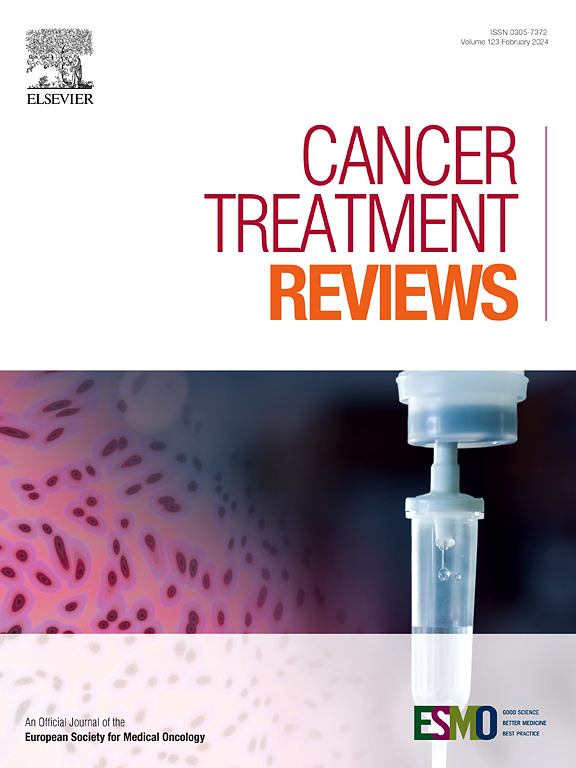From ICI to ICU: A systematic review of patients with solid tumors who are treated with immune checkpoint inhibitors (ICI) and admitted to the intensive care unit (ICU)
IF 9.6
1区 医学
Q1 ONCOLOGY
引用次数: 0
Abstract
Purpose
Immune checkpoint inhibitors (ICIs) have improved the survival of patients with different solid tumors and even resulted in cure of metastatic disease. Since the introduction of ICIs, an increasing number of patients is admitted to the ICU for severe and potentially life-threatening immune related adverse events (irAEs). The outcome of patients who are admitted to the ICU because of severe irAEs is still unknown. The aim of this systematic review is to collect evidence on the outcomes of patients with solid tumors who are admitted to the ICU because of irAEs.
Methods
Medline, Embase, Cochrane central register of controlled trials and Google Scholar were searched systematically from 1975 to 24 September 2024. Articles were only included when describing patients with solid tumors who were admitted to the ICU because of irAEs after treatment with ICIs. Two independent reviewers extracted the data and assessed the risk of bias.
Results
A total of 183 articles were included: two prospective ICU population-based studies, four retrospective ICU population-based studies, 25 retrospective studies describing irAEs with incidental ICU admissions, one review of case reports, and 153 articles with a total of 177 case reports. The six ICU population-based studies contained a total of 169 patients who were admitted to the ICU due to irAEs. In these six studies, the most frequently reported irAEs were pneumonitis and neurological irAEs. Of these 169 patients, 26% of the patients died on the ICU and an additional 8% of patients in the three to six months thereafter due to irAEs or disease progression. In all 183 included articles, various irAEs were described and the reported mortality rate varied from 0 to 53%.
Conclusion
The potential favorable outcomes of both the solid tumors and irAEs will probably result in more need for ICU admissions. Prospective clinical trials are needed to optimize the treatment strategy of severe irAEs at the ICU. Based on the favourable outcomes after life-threatening irAEs, ICU admission should definitely be considered for patients with solid tumors who have life-threatening irAEs.
从ICI到ICU:对接受免疫检查点抑制剂(ICI)治疗并入住重症监护病房(ICU)的实体瘤患者的系统回顾
目的免疫检查点抑制剂(ICIs)提高了不同实体瘤患者的生存率,甚至导致转移性疾病的治愈。自引入ICIs以来,越来越多的患者因严重和可能危及生命的免疫相关不良事件(irAEs)而入住ICU。因严重irae而入住ICU的患者的预后尚不清楚。本系统综述的目的是收集因irae而入住ICU的实体肿瘤患者预后的证据。方法系统检索1975年至2024年9月24日的medline、Embase、Cochrane对照试验中心注册库和谷歌Scholar。文章仅在描述实体肿瘤患者在接受ICIs治疗后因irae而入住ICU时被纳入。两名独立审稿人提取数据并评估偏倚风险。结果共纳入183篇文章:2篇基于ICU人群的前瞻性研究,4篇基于ICU人群的回顾性研究,25篇描述irae附带ICU入院的回顾性研究,1篇病例报告综述,153篇共计177例病例报告。这6项基于ICU人群的研究共纳入了169名因irAEs入住ICU的患者。在这六项研究中,最常报道的irAEs是肺炎和神经系统irAEs。在这169名患者中,26%的患者死于ICU,另有8%的患者在此后的3至6个月内死于irae或疾病进展。在所有纳入的183篇文章中,描述了各种irae,报告的死亡率从0%到53%不等。结论无论是实体瘤还是irAEs,其潜在的良好预后都可能导致更多的ICU住院需求。需要前瞻性临床试验来优化ICU重症irae的治疗策略。基于危及生命的irAEs后的良好结局,对于危及生命的irAEs实体肿瘤患者,绝对应该考虑入住ICU。
本文章由计算机程序翻译,如有差异,请以英文原文为准。
求助全文
约1分钟内获得全文
求助全文
来源期刊

Cancer treatment reviews
医学-肿瘤学
CiteScore
21.40
自引率
0.80%
发文量
109
审稿时长
13 days
期刊介绍:
Cancer Treatment Reviews
Journal Overview:
International journal focused on developments in cancer treatment research
Publishes state-of-the-art, authoritative reviews to keep clinicians and researchers informed
Regular Sections in Each Issue:
Comments on Controversy
Tumor Reviews
Anti-tumor Treatments
New Drugs
Complications of Treatment
General and Supportive Care
Laboratory/Clinic Interface
Submission and Editorial System:
Online submission and editorial system for Cancer Treatment Reviews
 求助内容:
求助内容: 应助结果提醒方式:
应助结果提醒方式:


